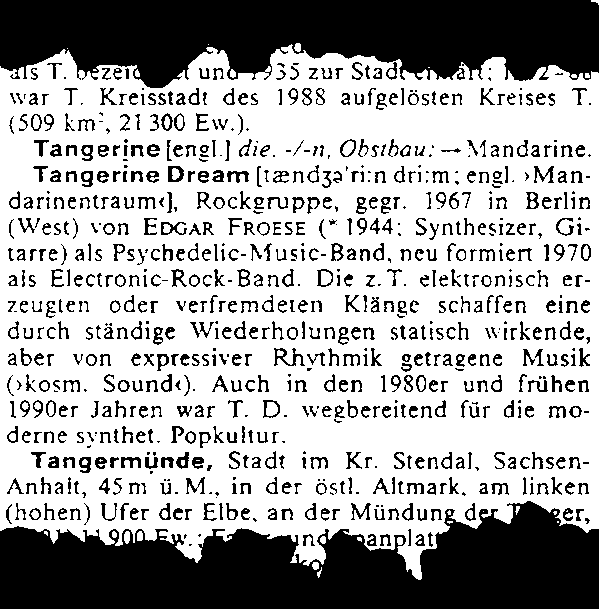 |  | |||||||||||||||||||||
Among Distinguished Names Of History(Dream Collector #7, June 1994) | |
You will find them between the name of a fruit ("Tangerine") and the name of a small German town on the banks of the Elbe river ("Tangermünde"). Tangerine Dream is mentioned in the new edition of the German Brockhaus Enzyklopädie -- which is compareable to the famous British Encyclopaedia Britannica. Only distinguished names can be found in this encyclopaedia -- persons of old and contemporary history. With eleven text lines, Tangerine Dream is among them on page 611 in Vol. 21. An encyclopaedia is not a file of rock musicians. So you will find only a handful of the most important band in the edition -- like The Beatles, The Rolling Stones, Genesis, Led Zeppelin, Deep Purple and Pink Floyd. You will hardly discover any other German rock bands besides Tangerine Dream and the avantgarde pop band Can. The Brockhaus does not list a huge number of pop bands which sell much more records than Tangehne Dream. You will not find a line about musicians like Mike Oldfield, even not about some of the most successful musicians in the world like Michael Jackson, Prince or Madonna. For pop and rock artists, being mentioned in this encyclopedia does not depend upon commercial success but upon the influence they had on pop history. What a difference: A new German pop and rock encyclopaedia was released last year. The two volumes do not mention Tangerine Dream, Klaus Schulze or any other electronic artists: They only list musicians who reached the top ten of the charts one time. Anyway, it may be a little bit more difficult to find any importance of most of these bands for pop history.
| |
| © 1994 by Christian Horn, Siegfried Lindhorst, Rolf Sonnemann and Peter Stöferle |
Copyright/Disclaimer © 2001-2025 by Michael Berling. Last Update: 2025-01-03 17:20 |

 Translation of German text: "Tangerine Dream [...; German translation of band name], rock band, founded in 1967 in Berlin (West) by EDGAR FROESE (*1944; synthesizer, guitar) as a psychedelic music band, formed new in 1970 as an electronic rock band. With the help of constant repetition partially electronically generated or alienated sounds create music that has an statical effect but is sustained by expressive rhythms ("cosmic sound"). Also in the 1980s and in the early 1990s, T.D. paved the way for the modern synthetic pop culture."
Translation of German text: "Tangerine Dream [...; German translation of band name], rock band, founded in 1967 in Berlin (West) by EDGAR FROESE (*1944; synthesizer, guitar) as a psychedelic music band, formed new in 1970 as an electronic rock band. With the help of constant repetition partially electronically generated or alienated sounds create music that has an statical effect but is sustained by expressive rhythms ("cosmic sound"). Also in the 1980s and in the early 1990s, T.D. paved the way for the modern synthetic pop culture."